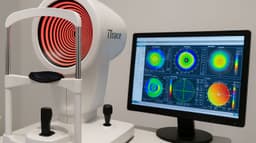
Eye Flashes and Floaters: Warning Signs You Shouldn’t Ignore
Flashers and floaters are common visual phenomena that individuals may experience, often caused by changes in the vitreous humor, the gel-like substance filling the eye. Floaters are tiny, semi-transparent specks or threads that seem to float across one's field of vision. They are typically composed of small bits of debris or clumps of gel casting shadows on the retina. While floaters are generally harmless, an abrupt increase in their number or the sudden onset of flashes of light could be indicative of more serious issues, such as retinal detachment. These visual symptoms occur when the vitreous pulls away from the retina, stimulating the optic nerve and creating the perception of flashes. Prompt medical attention is crucial if someone experiences a sudden onset of floaters or flashes, as it could be a sign of an underlying retinal condition that requires intervention.
Flashes, on the other hand, manifest as brief, bright streaks of light in the visual field. They can occur spontaneously or in response to eye movement. Flashes are commonly associated with the ageing process, as the vitreous undergoes changes and exerts traction on the retina. However, they can also result from trauma to the eye or inflammation. It's important to distinguish between harmless age-related floaters and flashes and those that may indicate a more serious condition. Regular eye examinations and consultation with an eye care professional are crucial in evaluating and monitoring these symptoms to ensure timely detection and appropriate management of any underlying retinal issues.
In case Of An Emergency
| Source of Flashes/Floaters | Seriousness Level | What to Do |
|---|---|---|
| Age-related Vitreous Detachment (Posterior Vitreous Detachment) | Low | Monitor symptoms, book an eye check-up for reassurance. |
| Eye Trauma (e.g., from an injury) | High | Immediate contact with an eye specialist for evaluation. |
| Retinal Tear | High | Immediate contact with an ophthalmologist, potential emergency treatment required. |
| Retinal Detachment | High | Emergency – Seek immediate treatment to avoid vision loss. |
| Migraine with Aura | Medium | Make an appointment with your GP to rule out other causes and manage migraines. |
| Diabetic Retinopathy | High | Contact your eye specialist for an immediate appointment and management of the condition. |
| Uveitis (Inflammation of the eye) | Medium | Make an appointment with your GP or an eye specialist for further assessment. |
| Flashes and Floaters After Eye Surgery | Medium | Make an appointment with your ophthalmologist to ensure healing is normal. |
| Gradual Increase in Floaters | Low | Monitor symptoms, book a routine eye exam if concerned. |
Flashes In The Eyes
Experiencing flashes in the eye can be a concerning symptom, and individuals should be attentive to certain signs that may indicate a more serious underlying issue. Here are key factors to look out for:
Sudden Onset
If flashes appear suddenly and are accompanied by other symptoms like a sudden increase in floaters, it may suggest a more urgent situation. Rapid changes in visual symptoms could be associated with conditions such as retinal tear or detachment.
Increased Frequency or Duration
Persistent or worsening flashes over time may be a cause for concern. If the flashes become more frequent or last longer than usual, it's essential to seek prompt medical attention.
Associated Floaters
Flashes accompanied by a sudden increase in the number of floaters or the appearance of a shadow or curtain-like effect in the peripheral vision could indicate issues such as retinal detachment. This combination of symptoms requires immediate evaluation by an eye care professional.
Loss of Peripheral Vision
A sudden loss of peripheral (side) vision could be a sign of a serious condition. If flashes are accompanied by a darkening or loss of vision in any part of the visual field, it's crucial to seek emergency eye care.
History of Eye Trauma or Surgery
Individuals with a history of eye trauma or recent eye surgery should be especially vigilant. Flashes following such events may warrant prompt assessment by an eye care specialist.
Pain or Discomfort
If the flashes are accompanied by pain, discomfort, or a feeling of pressure within the eye, it may indicate an inflammatory or infectious condition that requires immediate attention.
Anyone experiencing persistent or sudden flashes in the eye, especially when associated with other concerning symptoms, should seek prompt evaluation by an eye care professional. Early detection and intervention can be crucial in preserving vision and addressing potential underlying issues.
Treatment For Flashes In The Eye
The treatment for flashes in the eyes depends on the underlying cause. It's important to note that experiencing flashes may be a symptom of various eye conditions, and addressing the root cause is essential. Here are general guidelines, but it's crucial to consult with an eye care professional for personalised advice:
Immediate Consultation
If you experience sudden flashes of light, especially if accompanied by a sudden increase in floaters, a curtain-like shadow, or other visual disturbances, seek immediate medical attention. These symptoms could be indicative of a retinal tear or detachment, which requires prompt intervention.
Comprehensive Eye Exam
An eye care professional will conduct a comprehensive eye examination to assess the overall health of the eyes, including the retina. This may involve dilation of the pupils to get a better view of the back of the eye.
Treatment of Underlying Conditions
Treatment will depend on the specific diagnosis. For retinal issues, interventions such as laser therapy or surgery may be necessary to repair a tear or reattach the retina.
Monitoring
In some cases, particularly if the flashes are associated with age-related changes in the vitreous, no specific treatment may be needed. However, regular monitoring by an eye care professional is essential to ensure that any changes are promptly addressed.
Addressing Contributing Factors
If the flashes are related to other factors such as migraines, managing the underlying condition may help reduce or eliminate the symptoms.
It's crucial not to ignore persistent or sudden flashes in the eyes, as they could be a sign of a serious eye condition. Prompt evaluation by an eye care professional is essential for an accurate diagnosis and appropriate treatment. If you are experiencing flashes or any other unusual visual symptoms, schedule an appointment with an eye doctor as soon as possible.

Floaters In The Eyes
While floaters are a common occurrence and are often harmless, there are certain signs associated with them that may indicate a need for medical attention. Here are some factors to consider when experiencing floaters in the eye:
Sudden Onset or Increase
If you suddenly notice a significant increase in the number of floaters or if they appear suddenly, it could be a sign of a more serious issue, such as a retinal tear or detachment. Seek prompt medical attention if you experience this.
Flashes of Light
If floaters are accompanied by flashes of light, especially if these flashes are sudden or persistent, it may suggest traction on the retina. This could be a sign of a retinal tear or other retinal issues.
Change in Size or Shape
Changes in the size, shape, or density of floaters may be indicative of underlying changes in the vitreous or retina. If you observe such changes, it's advisable to consult with an eye care professional.
Loss of Peripheral Vision
If floaters are accompanied by a sudden loss of peripheral (side) vision or the appearance of a shadow or curtain-like effect, it may be a sign of a more serious condition like retinal detachment.
Pain or Eye Redness
Pain, redness, or discomfort along with the presence of floaters may indicate inflammation or other eye issues. Seek medical attention if you experience these symptoms.

Previous Eye Trauma or Surgery
Individuals with a history of eye trauma or recent eye surgery should be vigilant about changes in floaters. These changes may be a signal of complications related to the trauma or surgery.
While many floaters are harmless and part of the normal ageing process, any sudden or significant changes in floaters should be evaluated by an eye care professional.
Regular eye examinations are also important for monitoring eye health and catching potential issues early. If you notice any concerning symptoms related to floaters, it's advisable to schedule an appointment with an eye doctor for a thorough examination.
Treatment For Floaters In The Eyes
Treatment for floaters in the eyes depends on the underlying cause. In many cases, floaters are a normal part of the ageing process and may not require specific treatment. However, if floaters are severe, persistent, or associated with other symptoms, medical intervention may be considered. Here are some approaches:
Observation
In many cases, especially if the floaters are not causing significant visual disturbance and are not associated with other concerning symptoms, the recommendation may be to observe and monitor the condition. Floaters can become less noticeable over time as the brain adjusts to their presence.
Vitrectomy
In severe cases where floaters significantly impact vision and quality of life, a surgical procedure called vitrectomy may be considered. During a vitrectomy, the vitreous humor containing floaters is removed and replaced with a clear solution. This procedure is typically reserved for cases with persistent and bothersome floaters.
Laser Therapy
Laser therapy is an option for some types of floaters. However, this approach is not suitable for all types of floaters, and the risks and benefits need to be carefully considered.
Moreover, not all floaters require treatment, and the decision to pursue intervention should be made in consultation with an eye care professional. Additionally, some floaters are associated with more serious conditions, such as retinal tears or detachments, which require immediate attention and may involve more complex treatments.
If you are experiencing bothersome floaters or if you notice any changes in your vision, it's crucial to consult with an eye care professional for a comprehensive eye examination. They can determine the underlying cause and recommend appropriate management based on your specific situation.
Are Floaters & Flashes Related?
Floaters and flashes in the eyes can be related, and their occurrence may share a common underlying cause. The vitreous humor, a gel-like substance filling the eye, may undergo changes with age, leading to the development of floaters—tiny specks or threads that appear to float across the field of vision. When the vitreous pulls away from the retina, it can stimulate the optic nerve and create the perception of flashes of light. In some cases, flashes may accompany the sudden onset of floaters, especially if the vitreous traction on the retina is strong enough to cause a retinal tear or detachment. The combination of floaters and flashes can be indicative of more serious retinal conditions, warranting immediate medical attention to prevent potential vision-threatening complications.
Can Stress Cause Flashes In The Eye?
Stress itself is not a direct cause of flashes in the eye. However, stress can contribute to or exacerbate certain health conditions that may lead to visual symptoms, including flashes. For instance, stress is associated with an increased risk of migraine headaches, and migraines can sometimes cause visual disturbances, including flashes of light.
In addition, stress can affect overall health and well-being, potentially influencing blood pressure and circulation. Changes in blood flow to the eyes can contribute to visual symptoms, but this is more likely to manifest as blurry vision rather than flashes.
What Are Flashes In The Eyes At Night?
Flashes in the eyes at night can be associated with various factors, and their occurrence may be attributed to different causes. In low-light conditions, such as during the night, the eyes may become more sensitive to changes in the vitreous humor.
One common cause of flashes in the eyes, especially at night, is related to the vitreous pulling away from the retina. As the vitreous separates, it can stimulate the retina, leading to the perception of brief flashes of light. This process is known as vitreous traction and is a common occurrence, particularly as part of the natural ageing process.
If you experience new or persistent flashes in your eyes, particularly at night, it is advisable to consult with an eye care professional for a thorough examination to determine the cause and appropriate course of action.

Next Steps
Are floaters and flashes causing visual disturbances and impacting your daily life? At My-iClinic in London, our dedicated team of experienced eye care professionals specialises in the diagnosis and treatment of floaters and flashes.
Why Choose My-iClinic?
- Expertise: Trust our skilled ophthalmologists who bring a wealth of knowledge and experience to address your eye concerns.
- Cutting-Edge Technology: Benefit from state-of-the-art diagnostic tools and advanced treatment options for optimal precision and effectiveness.
- Personalised Care: Experience patient-centric care tailored to your unique needs, ensuring the best possible outcome for your vision.
Take the First Step to Clearer Vision!
Don't let floaters and flashes compromise your eyesight. Schedule a consultation with My-iClinic today. Our team is committed to providing comprehensive eye care, restoring clarity, and preserving the health of your eyes.
Find out more by Speaking to our team









